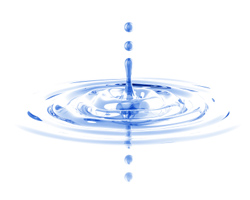Myths about Water
 Eight glasses
Eight glasses
It's not true that we need exactly eight glasses of water a day—if we drink other beverages and consume a sensible amount of fresh fruits and vegetables. We retain half the fluid from coffee or tea as water in our body. Thus, the myth that coffee and tea dehydrate (as highly sugared drinks do) isn't true. Drink two glasses of water upon rising and one before bed, along with several glasses a day besides other beverages, unless your activity level demands more.
The average person has 10 to 12 gallons of water in his or her body. To maintain this level, we need about three quarts of water a day under normal conditions. Fresh fruits, vegetables, and food may provide about half. (Fruits and vegetables are more than 90 percent water. Even dry foods contain water—bread is 35 percent and crackers are 5 percent water.) Water and beverages supply the rest.
To make water more interesting, squeeze a little lemon, lime, or mandarin orange into your glass.
A good idea is to keep a bottle or jug of water at hand and finish it by the end of the day. Try to drink water from glass containers. Soft plastic containers may possibly shed chemicals into the water (especially distilled water) and these may act as "hormone disruptors" to the immune and reproductive systems. It is conceivable, for example, that trucks carrying water in plastic containers could be detained in hot areas, overheating the inside of the trucks, leading to toxic chemical exposure in the bottled water. Until more is known, it is probably better to purchase water in glass containers when possible, or in the hardest plastics (as the questionable compounds are used to make plastics soft and flexible). Another option is to buy a quality water filter for your home.
Why Not Water from the Tap?
The water that comes out of your tap is far from perfect. Household water starts from natural sources and goes through a number of cleaning treatments at the city water plants, which makes you assume that the water is now "perfectly safe." Wrong. The water that comes out of your faucet may contain harmful elements, such as synthetic compounds like fossil fuel emissions, industrial effluents, human wastes, detergents, and solvents that originate from contaminated sources; estrogenic chemicals; and agricultural runoff containing pesticides and fertilizers. Some of these are immune-depressing and cancer-promoting chemicals.
Metals, radionucleotides (which cause cancer), bacteria (such as Cryptosporidium, a common contaminate that is immune to the action of chlorine), and viruses can make it through many treatment plants. For economic reasons, many problem substances are not filtered out by city water-treatment centers. Anything you take in through water will eventually circulate throughout all the tissues of your body. If your water comes from a private well, have it tested every several years.
Posted in Myths about Water
Ask a Question Or Join a Discussion


